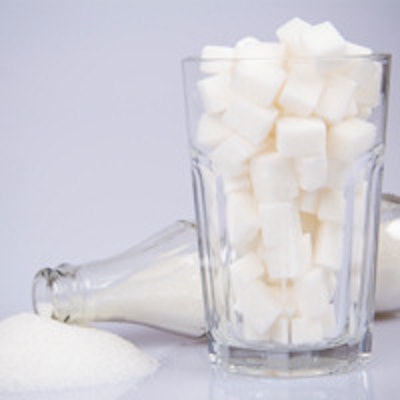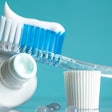
To reduce the significant financial and social burdens of caries, free sugars in the diet should make up no more than 3% of total energy intake, according to a new study by British researchers in BMC Public Health (September 16, 2014).
The study findings indicate that current approaches to controlling dental caries are failing to prevent high levels of caries in adults in all countries, according to the researchers. This is related to the current high amount of sugar intake worldwide, and a new and radical policy of progressive sugar reduction is needed, they noted. "It is now even more important to develop a radical prevention policy with a marked reduction in sugar intake since the use of fluoride on its own is insufficient to reduce substantially the burden of caries over the lifetime of individuals," they wrote.
According to World Health Organization (WHO) nutrition guidelines, "free sugars" include "monosaccharides and disaccharides added to foods by the manufacturer, cook, or consumer, and sugars naturally present in honey, syrups, fruit juices, and fruit concentrates."
Caries is the most common chronic disease worldwide, affecting 60% to 90% of schoolchildren and the majority of adults, according to a University College London (UCL) press release. In the U.S., 92% of adults ages 20 to 64 have had caries in at least one of their permanent teeth. The treatment of dental diseases costs 5% to 10% of total health expenditure in industrialized countries.
Sugar consumption should make up only 10% of total energy intake, ideally only 5%, based on WHO guidelines, even with the use of fluoridated water and fluoride toothpaste. That equals about 3 tablespoons (50 grams) of free sugars as the daily maximum, with 2 tablespoons (25 grams) as the target. Research published earlier this year suggests that 5% should be the maximum, with a target of less than 3% (Journal of Dental Research, January 2014, Vol. 93:1, pp. 8-18).
The researchers of the new study examined the relationship between sugar intake and the development and the lifelong burden of caries, to see whether the WHO goal of 10% level is optimum and compatible with low levels of caries. Using public health records from countries worldwide, the researchers compared dental health and diet over time across large populations of adults and children.
They found that the incidence of caries was much higher in adults than children, and they determined that an increase from near-zero sugar to 5% of energy intake doubles the prevalence of caries in children and continues to rise as sugar intake increases.
"Tooth decay is a serious problem worldwide, and reducing sugars intake makes a huge difference," stated study author Aubrey Sheiham, BDS, PhD, an emeritus professor of dental public health at UCL, in the release. "Data from Japan were particularly revealing, as the population had no access to sugar during or shortly after the Second World War. We found that decay was hugely reduced during this time, but then increased as they began to import sugar again."
The researchers also noted that a previous study found that only 2% of people living in Nigeria had caries when their diet contained almost no sugar, about half a teaspoon (2 grams) per day (British Dental Journal, 1967, Vol. 123, pp. 144-148). In comparison, some 92% of U.S. adults have had caries.
Radical policy changes needed
The researchers recommended radical policy changes to reduce sugar consumption and address the issue of caries.
"Our top priority is not to allow the idea of a magic single bullet to solve the problem to be developed," stated study co-author Philip James, MD, an honorary professor of nutrition at the London School of Hygiene & Tropical Medicine, in the release. "A fundamental aspect of public health planning is to develop society-wide measures which impact on the health of the whole community."
“We need to make sure the use of fruit juices and the concept of sugar-containing treats for children are not only no longer promoted, but explicitly seen as unhelpful.”
Governments should their revise their policies to reflect explicit dietary goals regarding sugar intake, according to the study authors.
"We need to make sure that use of fruit juices and the concept of sugar-containing treats for children are not only no longer promoted, but explicitly seen as unhelpful," Dr. James said. "Food provided at nurseries and schools should have a maximum of free sugars in the complete range of foods amounting to no more than 2.5% of energy."
Vending machines that sell sugary drinks in areas that are controlled or supported financially by local or central governments should be removed. Publicly supported facilities should not contribute to the expensive problems of dental caries, obesity, and diabetes, Dr. James noted.
The food industry should progressively reformulate their products to reduce or remove all sugar from their products, and food labels should label anything containing more than 2.5% sugars as "high," he recommended.
While acknowledging that how to curtail the flow of sugars in the food chain and divert sugar is a "huge" issue, Dr. James suggested, for instance, that sugar if produced at all could be converted into alcohol, as in Brazil, to be used as vehicle fuel. He also suggested that all sugar beet production should be phased out in the European Union (EU).
"This production is totally unnecessary and has always been unnecessary as the sugar cane producers of the lower income countries produce enough," he noted. "As part of the U.S./EU trade agreement, the U.S. should no longer be promoting the export of sugar, and the U.S. should also curtail production."
Dr. James also recommend a sugar tax to increase the cost of sugar-rich food and drinks. This could simply be a tax on sugar as a mass commodity, since taxing individual foods depending on their sugar content would be an enormously complex administrative process. The retail price of sugary drinks and sugar rich foods should be increased by at least 20% to have a reasonable effect on consumer demand, he concluded.



















